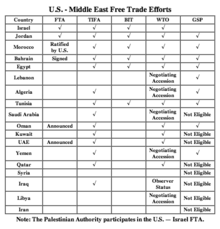| Part of a series on |
| International trade agreements |
|---|
| Stages of economic integration around the World |
 |
| Proposed trade agreements |
| Related concepts |
|
The U.S.–MEFTA initiative started in 2003 with the purpose of creating a U.S.–Middle East Free Trade Area by 2013.
The U.S. objective with this initiative has been to gradually increase trade and investment in the Middle East, and to assist the Middle East countries in implementing domestic reforms, instituting the rule of law, protecting private property rights (including intellectual property), and creating a foundation for openness, economic growth, and prosperity.
Among the stated objectives are:

- Actively supporting WTO membership of countries in the Middle East and Maghreb
- Expanding the Generalized System of Preferencess that currently provides duty-free entry to the U.S. market for some 3,500 products from 140 developing economies
- Negotiating Trade and Investment Framework Agreements that establish a framework for expanding trade and resolving outstanding disputes
- Negotiating bilateral investment treaties with interested countries by obligating governments to treat foreign investors fairly and offering legal protection equal to domestic investors
- Negotiating comprehensive free trade agreements with willing countries that demonstrate a commitment to economic openness and reform
- Helping to target more than $1 billion of annual U.S. funding and spur partnerships with private organizations and businesses that support trade and development
| Country | FTA | TIFA | BIT | WTO | GSP |
|---|---|---|---|---|---|
| Israel | |||||
| Jordan | |||||
| Morocco | |||||
| Bahrain | |||||
| Egypt | |||||
| Lebanon | Negotiating Accession |
||||
| Algeria | Negotiating Accession |
||||
| Tunisia | |||||
| Saudi Arabia | Not Eligible | ||||
| Oman | |||||
| Kuwait | Not Eligible | ||||
| UAE | Announced | Not Eligible | |||
| Yemen | Negotiating Accession |
||||
| Qatar | Not Eligible | ||||
| Syria | Not Eligible | ||||
| Iraq | Observer Status | Not Eligible | |||
| Libya | Negotiating Accession |
Not Eligible | |||
| Iran | Not Eligible | ||||
| Note: The Palestinian Authority participates in the U.S.–Israel FTA. | |||||
YouTube Encyclopedic
-
1/5Views:132 0443 6462 4807 0541 190
-
What is Free Trade Agreement FTA | Pros & cons, benefits, India's trade policy
-
Why is African trade under performing? | LSE Research
-
Free Trade Zone - What is it?
-
What is Abraham Accords । Israel-UAE Free Trade Agreement । Middle East । Around The World
-
China’s Rise in the Global South: The Middle East, Africa, and Beijing’s Alternative World Order
Transcription
Active agreements
US agreements
The United States currently has several bilateral free trade agreements with nations in the region.
 Bahrain Bahrain–United States Free Trade Agreement
Bahrain Bahrain–United States Free Trade Agreement Jordan Jordan–United States Free Trade Agreement
Jordan Jordan–United States Free Trade Agreement Morocco Morocco–United States Free Trade Agreement
Morocco Morocco–United States Free Trade Agreement Oman Oman–United States Free Trade Agreement
Oman Oman–United States Free Trade Agreement Israel Israel-United States Free Trade Agreement
Israel Israel-United States Free Trade Agreement
Middle Eastern agreements
Additionally many potential MEFTA states are already members of the multilateral Greater Arab Free Trade Area.
 Algeria
Algeria Bahrain
Bahrain Egypt
Egypt Iraq
Iraq Jordan
Jordan Kuwait
Kuwait Lebanon
Lebanon Libya
Libya Morocco
Morocco Oman
Oman Palestine
Palestine Qatar
Qatar Saudi Arabia
Saudi Arabia Sudan
Sudan Syria
Syria Tunisia
Tunisia United Arab Emirates
United Arab Emirates Yemen
Yemen
Other states are members of the multilateral Arab Maghreb Union.
The following, expected to constitute MEFTA,[1] are not members of existing Middle Eastern agreements:
See also
- Greater Middle East
- Middle East Partnership Initiative
- Lists of free trade agreements
- List of trade blocs
- Middle East economic integration
References
- ^ Staff, "Middle East Free Trade Area: Progress Report", Congressional Research Service, 1 June 2006
External links
- Official site
- White House Press Release – 9 June 2004
- U.S. Briefing at Department of State – 6 May 2005
- White House Press Release – 17 October 2005
